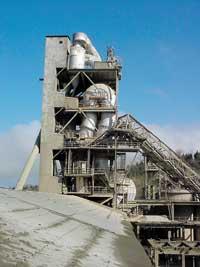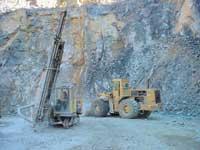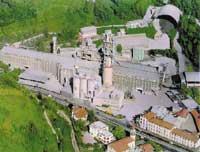Cement plants, problem generator and solutions
Although cement companies are recycling products that are not owned by them in recent years, their main objective is cement production, hence the highest income. In the Autonomous Community of the Basque Country there are two cement plants: Cementos Rezola Financiera y Minera S.A. and Cementos Lemona S.A. Both follow the same cement manufacturing procedure.
How is cement made?

The raw material comes from two different quarries: on the one hand, limestone is extracted and on the other, clay. These raw materials are composed of four components (iron oxide (III), aluminum oxide, silicon and calcium carbonate) and their proportions are carefully measured until obtaining a homogeneous composition.
Depending on the moisture of the raw materials, between 1,600 and 1,800 kg of quarry materials will be needed to obtain 1,000 kg of Portland clinker. It is a mixture of Clinker Portland limestone (calcium carbonate – Ca CO 3) and clay (aluminum silicate). These two raw materials are introduced in a 1500ºC furnace. In the combustion process they create mineralogical species and the new composition is called clinker Portland. The grinding of this last compound results in obtaining cement.
But in this process, what is the most polluting element of our environment? The process of obtaining the Clinker Portland consists in the decarbonation of the calyx when the components are in the oven at 550-900 °C, when the quicklime (CaO) and carbon dioxide (CO 2) are produced due to the greenhouse effect. CO 2 a is mostly harmful and the worst thing is that they have to use a lot: to get a kilo of clinker Portland is emitted half a kilo of CO 2.
To avoid the damage caused by calcium carbonate, Cementos Rezola is trying to replace some fuels. These fuels cannot be burned in furnaces of any kind and if the same combustion process that has been followed so far, the waste would generate CO 2 without taking any benefit to its energy.
Looking for respect for the environment...

The two Basque cement companies, with the aim of changing the image of their companies and improving their environmental behaviour, have joined other works. Cementos Rezola has dedicated 22% of its investments, more than 18 million euros, to the change of image and to projects that contribute to the respect of the environment. In 2000 ISO 14001 was obtained for all its workshops, being the first to obtain it at the state level.
Cementos Rezola Financiera y Minera S.A. has installed new filters in its cement plants and has modernized the existing ones. On the other hand, the optimization of production processes has allowed to reduce energy consumption.
In addition, Basque cement companies have tried to solve fuels and other polluting products. Waste is known to be a big problem, because we don't know what to do with it. An example of this is the agreement signed in March 2001 in the Autonomous Community of the Basque Country to eradicate bovine spongiform encephalopathy, better known as ‘mad cow disease’. The agreement was signed by ranchers, slaughterhouses, flour manufacturers and cement manufacturers. As a result of this agreement, Cementos Rezola currently works in the burning of flours of animal origin in clinker ovens.

In addition, they are valued in their ovens for the use of alternative fuels and avoid dumping to landfill of products such as chemical plaster, casting sand, petroleum waste, lamination shell, steel slag and ash of thermal power plants, among others.
Cementos Rezola and many other Spaniards, with the aim of improving their image and maintaining the challenge of protecting the environment, want from now on to use their ovens to burn or value animal fats, oils, corn, plastics and solvents.





